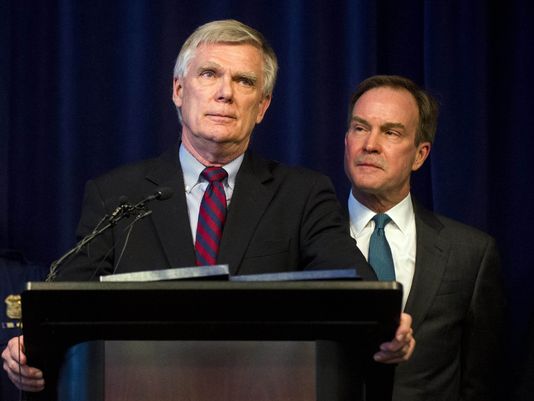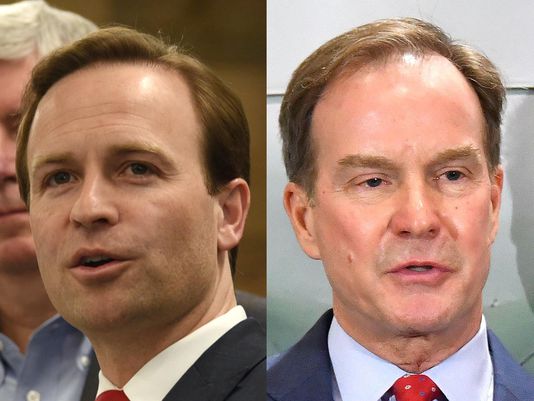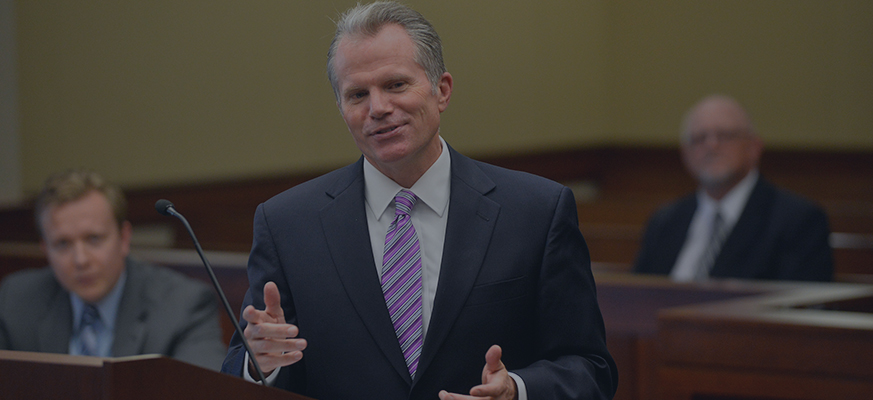
AG Schuette letter says MSU investigator Forsyth serves ‘under my direction’
February 14, 2018
Statewide Gambling Expansions and Voter Referendum Mandates
June 2, 2018The fight between Republican gubernatorial foes Bill Schuette and Brian Calley over the Flint water crisis prosecution might not decide the primary, experts say, but it poses problems for each and has divided their party.
Attorney General Schuette and Special Prosecutor Todd Flood have charged 15 former and current Flint and state officials with criminal wrongdoing in the Flint lead-contaminated water crisis. Four defendants have agreed to plea deals.
Four of six current and former officials charged with involuntary manslaughter in the 2014-15 Flint-area Legionnaires’ disease deaths are appointees of Gov. Rick Snyder: Michigan Health and Human Services Director Nick Lyon, state Chief Medical Executive Eden Wells and Flint emergency managers Darnell Earley and Gerald Ambrose.
Lt. Gov. Calley last week repeated his contention the charges against Lyon and Wells are politically motivated and a “gross abuse of power.” Schuette said Calley’s comments were “desperation politics” since the lieutenant governor trails him in the polls and reiterated the prosecution is pursuing justice for Flint’s victims.
Primary candidate state Sen. Patrick Colbeck of Canton Township declined to discuss the issue, while Dr. Jim Hines of Saginaw, another gubernatorial candidate, said the legal process is taking too long, costing taxpayers too much and raising questions among people about whether Flint “is being politicized by our leaders.”
The issue may arise Wednesday during the first GOP debate, a one-hour forum being held in the studio of WOOD-TV in Grand Rapids and televised and live streamed statewide, including in Metro Detroit on WDIV-TV (Channel 4).
Schuette has sporadically sparred with Snyder since announcing his investigation in January 2016.
“He has angered a lot of people in the state who support Snyder, a lot of wealthy contributors,” said Bill Ballenger of the Ballenger Report and a former GOP lawmaker.
Calley’s loyalty to Snyder could prove to be a weakness since the Flint crisis damaged the governor’s reputation, but most experts say primary voters are focusing on other issues, such as tax cuts and who is more politically conservative.
“I see zero evidence that it’s mattered in a single general election campaign at all,” said David Forsmark, a political consultant and president of Winning Strategies in the Flint suburb of Flushing.
Aside from Democrat Flint Mayor Dayne Walling losing re-election in 2015, no political candidate has been affected, Ballenger said.
“I think it’s a nothing burger as a political issue in a Republican primary,” he said.
But John Truscott, president of the Lansing-based consulting firm Truscott Rossman and a GOP strategist, countered that the seven-month-long preliminary exam hearings for Lyon and Wells could hurt Schuette.
“A lot of people are asking: Does the attorney general want this wrapped up by the election?” said Truscott, a longtime friend of Lyon. “Is he dragging this out past the election or does he really want this done?”
Justice or just politics?
While Genesee County judges will decide whether Lyon, Wells and other Flint crisis defendants are bound over for trial, the cases have been debated in the court of public opinion.
After Lyon was charged with involuntary manslaughter and Wells with obstruction of justice, Snyder kept them on staff as he called them “committed” to Flint’s recovery. Schuette questioned the move and called for their resignations. In October 2017, Flood added an involuntary manslaughter charge against Wells.
The evidentiary hearings — which are scheduled to continue on May 21 for Lyon and May 30 for Wells — have been marathon proceedings.
Calley, a Portland Republican, has argued that trial publicity rules “have been violated repeatedly” at press conferences regarding Schuette’s Flint investigation, “a stark contrast” to the reserved press conferences regarding Special Prosecutor Bill Forsythe’s investigation into Michigan State University’s handling of Larry Nassar sexual abuse complaints.
“Why would they risk the entire case to make these extrajudicial statements unless it was for political gain?” Calley told The Detroit News.
Flood and Forsythe have different styles, Schuette said.
The willingness of Flint Dr. Mona Hanna-Attisha and Virginia Tech water expert Marc Edwards to testify for the defense at the Lyon and Wells hearings spoke volumes about the weakness of the cases, as did the length of the preliminary examination, Calley said.
“Either they’re timing it out for political purposes or they filed charges and weren’t prepared to prove those charges,” he said. “Neither one is a good answer.”
Schuette said the charges he authorized were about “accountability” for the 12 people who died from Legionnaires’ disease and the nearly 100,000 residents exposed to the city’s lead-tainted water.
“This is not some political chessboard where you try to gain advantage,” Schuette told The Detroit News. “That’s such a callous and arrogant attitude.”
Every prosecutor handles publicity surrounding a case differently, the attorney general said, and referred to Calley’s criticisms of his conduct as “desperation politics.”
“If this is about politics, the political decision would have been to do nothing, but then I would have been violating my oath of office,” said Schuette, a Midland Republican.
Officials take sides
The issue has divided former and current law enforcement officials.
Former Supreme Court Chief Justice Maura Corrigan called Lyon a dedicated public servant “incapable” of intentional harm.
Frank Kelley, a Democrat who was Michigan’s longest-serving attorney general, has called for the charges against Lyon and Wells to be dropped, saying “show trials” and “finger-pointing news conferences” will have a chilling effect on public service.
“Given how long this has gone on and that the prosecution has been all over the place, I do think (Calley’s) comments have merit,” Truscott said.
But Schuette is making lemonade out of lemons, prosecuting a complex case against defendants with money and lawyers, said former Attorney General Mike Cox, a Republican who preceded Schuette in office. He compared the scale of the Flint investigation to a federal court case, which typically moves more slowly.
“What he’s doing is kind of awkward, and people in state government don’t like the fact that some state employees might be in the cross-hairs, but Bill Schuette didn’t create that,” Cox said.
Genesee County Prosecutor David Leyton, who has partnered on the Flint prosecutions, said the delays are due to the case’s complexity as well as the unusual decision by the legal teams of Lyon and Wells to call defense witnesses at a preliminary examination.
“I can count on one hand in four terms as Genesee County prosecutor I have seen where the defense has called witnesses” during a preliminary exam, said Leyton, a Democrat who ran against Schuette for attorney general in 2010.
Chief Investigator Andy Arena, former chief of Detroit’s FBI office, said the length of the ongoing investigation and prosecution fits the crime, which “didn’t happen overnight.”
“I get asked that all the time: Some of these charges are different, and we’ve never seen anything like this,” Arena told The Detroit News. “I tell people, ‘Yeah, but we’ve never seen the water system of an American city poisoned.’ ”
Effect on Election Day?
The Democrats are signaling they will attack the GOP primary victor on Flint in the fall, leveling criticism at Calley and Schuette alike.
Former Senate Minority Leader Gretchen Whitmer was handing out bottled water two weeks ago in Flint after the Snyder administration stopped subsidized deliveries in the city and wants to expedite the replacement of lead service lines across Michigan.
Former Detroit health director Abdul El-Sayed has been endorsed by “Little Miss Flint” water activist Mari Copeny and has called for giving a minimal amount of free water to drink, bathe, cook and clean to the state’s poorer residents. Ann Arbor businessman Shri Thanedar has criticized lawmakers for “dragging their feet to help” Flint residents and wants to remove all lead service lines from municipal systems within a decade.
Democratic Flint Mayor Karen Weaver said she hopes Flint remains a focus of the gubernatorial race, noting the crisis was debated during the 2016 presidential election.
“We want to hear what people say about Flint and who’s going to have Flint’s back,” Weaver said.
While Flint won’t be a dominant primary issue, Ballenger said it could cost votes on the margins.
Calley’s campaign message to “continue the comeback” and his loyalty to Snyder so far is “honorable,” he said, but not popular given the criticism of Snyder’s handling of the water crisis.
“He was the ultimate good soldier,” Ballenger said of the months Calley spent in Flint after the crisis came to light. “He did anything and everything you could expect in Flint.”
There are pitfalls for Schuette, too, he said.
“The worst thing that could happen to Schuette is that these people are not bound over or they’re all exonerated,” Ballenger said. “The next worst thing is that it trickles along, past the election” in November.
Others said the controversy is a political creation. The Calley-Schuette Flint sparring is an off-season melodrama enabled by a lengthened campaign season and super political action committees with too much money and time on their hands, Forsmark said.
“I have not heard one person, not one, bring up the Flint water stuff as a reason they’re for or against a single candidate,” he said.
eleblanc@detroitnews.com
(517) 371-3661
GOP gov debate
Host: WOOD-TV in Grand Rapids
Time: 7-8 p.m. Wednesday
Participants: Lt. Gov. Brian Calley of Portland, state Sen. Patrick Colbeck of Canton Township, Dr. Jim Hines of Saginaw and Attorney General Bill Schuette of Midland
Broadcast: WDIV-TV, WOOD TV, four other television stations and the Michigan Republican Party are the only stations and groups authorized to televise or livestream.
Original Article: http://michiganradio.org/post/howes-ford-and-foundation-mend-broken-relationship-economic-boon-southwest-michigan#stream/0



